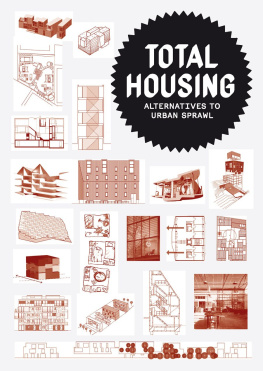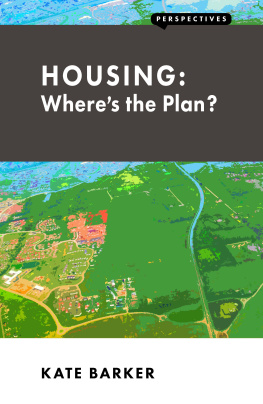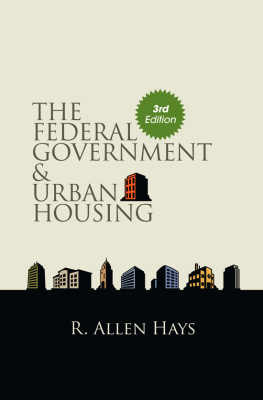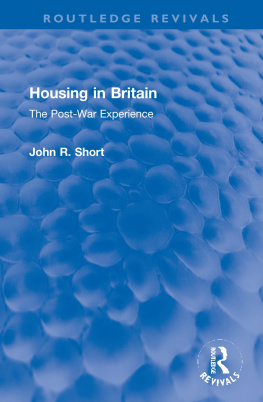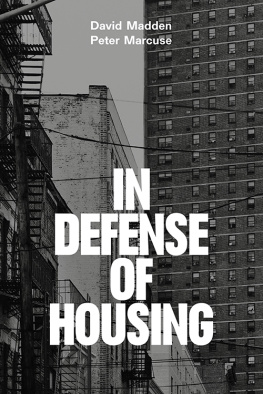FROM LOCAL ACTION TO GLOBAL NETWORKS: HOUSING THE URBAN POOR
Global Urban Studies
Series Editor: Laura A. Reese, Michigan State University, USA
Providing cutting-edge interdisciplinary research on spatial, political, cultural and economic processes and issues in urban areas across the US and the world, volumes in this series examine the global processes that impact and unite urban areas. The organizing theme of the book series is the reality that behavior within and between cities and urban regions must be understood in a larger domestic and international context. An explicitly comparative approach to understanding urban issues and problems allows scholars and students to consider and analyze new ways in which urban areas across different societies and within the same society interact with each other and address a common set of challenges or issues.
Books in the series cover topics which are common to urban areas globally, yet illustrate the similarities and differences in conditions, approaches, and solutions across the world, such as environment/brownfields, sustainability, health, economic development, culture, governance and national security. In short, the Global Urban Studies book series takes an interdisciplinary approach to emergent urban issues using a global or comparative perspective.
From Local Action to Global Networks: Housing the Urban Poor
Edited by
PETER HERRLE
Technische Universitt Berlin
ASTRID LEY
University of Stuttgart, Germany
JOSEFINE FOKDAL
Berlin University of Technology, Germany
ASHGATE
Peter Herrle, Astrid Ley and Josefine Fokdal, and the contributors 2015
All rights reserved. No part of this publication may be reproduced, stored in a retrieval system or transmitted in any form or by any means, electronic, mechanical, photocopying, recording or otherwise without the prior permission of the publisher.
Peter Herrle, Astrid Ley and Josefine Fokdal have asserted their right under the Copyright, Designs and Patents Act, 1988, to be identified as the editors of this work.
Published by
Ashgate Publishing Limited
Wey Court East
Union Road
Farnham
Surrey, GU9 7PT
England
Ashgate Publishing Company
110 Cherry Street
Suite 3-1
Burlington, VT 05401-3818
USA
www.ashgate.com
British Library Cataloguing in Publication Data
A catalogue record for this book is available from the British Library.
The Library of Congress has cataloged the printed edition as follows:
From local action to global networks : housing the urban poor / [edited] by Peter Herrle, Astrid Ley and Josefine Fokdal.
pages cm. -- (Global urban studies)
Includes bibliographical references and index.
ISBN 978-1-4724-5051-7 (hardback) -- ISBN 978-1-4724-5052-4 (ebook) -- ISBN 978-1-4724-5053-1 (epub) 1. Housing policy--Developing countries--Citizen participation. 2. Urban poor--Housing--Developing countries. I. Herrle, Peter. II. Ley, Astrid. III. Fokdal, Josefine.
HD7391.F76 2015
363.596942--dc23
2015011894
ISBN 9781472450517 (hbk)
ISBN 9781472450524 (ebk-PDF)
ISBN 9781472450531 (ebk-ePUB)
Contents
Peter Herrle, Astrid Ley and Josefine Fokdal
Somsook Boonyabancha and Thomas Kerr
Astrid Ley, Josefine Fokdal and Peter Herrle
Beate Ginzel
Interview with Gnter Meinert and Ren Peter Hohmann
Josefine Fokdal, Astrid Ley and Peter Herrle
Benjamin H. Bradlow
Anna Marie Karaos and Emma Porio
Klaus Teschner
Diana Mitlin
Liza Cirolia, Warren Smit and James Duminy
Matt Nohn
Peter Herrle, Josefine Fokdal and Astrid Ley
List of Figures
List of Tables
Notes on Contributors
Somsook Boonyabancha is an architect and planner who worked with Thailands National Housing Authority from 1977 to 1989. In 1992, she helped set up the Urban Community Development Organization (UCDO) and continued to work with UCDO, becoming its director in 1998. She was director of CODI (formerly UCDO) since its establishment in 2000 until 2009 and is still active in CODIs work as an advisor and member of its governing board. She is a founding member and director of the Asian Coalition for Housing Rights (ACHR), a regional organization, since its establishment in 1989, and since 2009 Somsook has facilitated the Asian Coalition for Community Action (ACCA) programme by ACHR.
Benjamin H. Bradlow is currently a PhD student in the department of sociology at Brown University, where he is also a National Science FoundationIGERT fellow of the Graduate Program in Development at the Watson Institute for International Studies. His research interests include urban politics, comparative historical sociology, and the political economy of development. He holds a Masters in City Planning (MCP), and Bachelor of Arts (BA) in history from Swarthmore College.
Liza Cirolia is a researcher at the African Centre for Cities at the University of Cape Town. Since 2012, she has been the coordinator of the Sustainable Human Settlements Citylab. Over the past ten years, Liza worked with NGOs in Oakland, Rio de Janeiro, Nairobi, and Cape Town. The majority of her work has focused on urban and social development. More recently, Lizas research has focused on the vexing issues of land, infrastructure, and housing in African cities. She received a Bachelor of Arts at the University of California, Berkeley and a Masters in City and Regional Planning at University of Cape Town.
James Duminy is a research officer at the African Centre for Cities, University of Cape Town, South Africa, and general secretary of the Association of African Planning Schools. He has previously worked as an analyst and writer for the Imagine Durban participatory planning project. His research interests centre on the history of urban planning and development in Africa, emerging approaches to theorizing African urbanisms, as well as the ethics of planning thought and praxis in Southern urban contexts.
Josefine Fokdal is lecturer and researcher at the Institute for Architecture and International Urbanism at Technische Universitt Berlin, Germany. In 2014 she was recipient of a Marie-Curie scholarship through the Urban Knowledge Network Asia, hosted by the Hong Kong University and she has been part of the research team on networking of urban poor in the housing field since 2011. Her research and writings spans the research fields of spatial theory, housing, urban governance and urban patterns of mega-cities in Asia. Her current research focuses on spatial perceptions and urban inequality in burial practices in contemporary cities in Southeast Asia.
Beate Ginzel has studied architecture in Dresden and Vaasa (Finland). From 19982003 she worked as an architect in Germany, the Netherlands and Tanzania. After this she was researcher and lecturer at the Department for Urban Development and Construction Management (ISB) at Leipzig University from 20042014. Her activities focused on urban development issues in Europe and the Global South. In 2012 she received her PhD in analysis of transnational networks of local communities in urban areas of the Global South. Since 2014 she is head of department at the office for urban renewal and housing promotion of the city of Leipzig.
Peter Herrle is professor for international urbanism. Until 2012 he was Director of the Habitat Unit at Faculty VI, Technische Universitt Berlin. He is also Advisory Professor at the Tongji University Shanghai. His research fields include topics such as megacities, urban informality, urban governance, housing, and cultural identity. He has also been a consultant to bilateral and international development agencies and NGOs in various fields including housing, decentralization, participative planning and urban planning. He is co-editor of the Habitat International Series at LIT-Publishers and co-editor of the Megacities and Global Change Series at Steiner Publishers.
Next page

